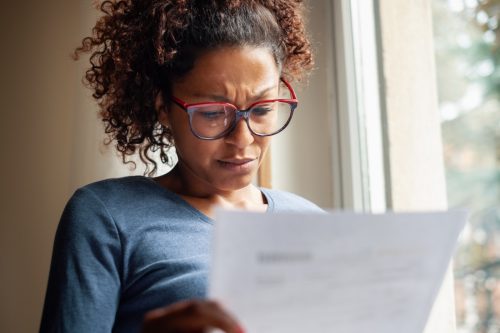If You Get This Letter From the IRS, Don't Toss It, Experts Warn
Your tax return might not end up getting processed if you ignore this.

From unsolicited credit card offers to that magazine subscription you don't remember signing up for, there's a lot of junk that ends up in our mailboxes. This can make sorting through your mail when you actually need something a tedious task. But don't let boredom allow you to throw out just anything. With tax season already underway, the Internal Revenue Service (IRS) might be sending some important notices to taxpayers. And there's one letter from the agency that is so crucial, that ignoring it could prevent your entire return from being processed—meaning you won't get your tax refund. Read on to find out what piece of mail you should be looking out for from the IRS.
RELATED: The IRS Just Issued This Major New Warning to Taxpayers.
If you get a letter from the IRS about verifying your identity, don't throw it away.

The IRS sends out a number of notices this time of year, but there is one in particular you need to make sure you don't misplace: Letter 5071C or Letter 6331C. According to the agency, this letter is sent to taxpayers whose identity needs to be verified. The letter requests a response within 30 days, although the IRS says it "will continue to work with you regardless of the amount of days that have passed."
Waiting might only be to your detriment, however. If you ignore this letter or throw it away and don't verify your identity, your return will not be processed by the IRS. "Until we hear from you, we won't be able to process your tax return, issue refunds, or credit any overpayments to your account," the agency warns on its website.
You can verify your identity online.

Once you receive this letter from the IRS, the quickest way to verify your identity will be through the agency's online Identity Verification Service. You will need your letter and a copy of the tax return for the tax year shown in the letter to do this. Taxpayers can also call the toll-free IRS Identity Verification telephone number which will be listed in the 5071C or 6331C letter if they prefer to talk to a representative. But if the IRS is unable to verify your identity online or over the phone, you will have to make an appointment for an in-person meeting.
Once you have successfully verified your identity with the IRS, the agency will continue processing your tax return. "It will take up to nine weeks to receive your refund or credit any overpayment to your account," the IRS says on its website. But if they find other problems with your return or your identity verification, they will have to contact you again which will delay your refund even more.
RELATED: For more financial news, sign up for our daily newsletter.
You might receive this letter even if you haven't filed a return yet.

Don't just wait until after your tax return is filed to start watching out for this potential letter because there is a chance you could get sent it even if you haven't filed. According to the IRS, you could receive this if someone has potentially filed a fraudulent tax return using your name and Social Security number or Individual Taxpayer Identification Number.
"If you didn't file an income tax return for the year above, it is important to let us know on the website above immediately and confirm that you may be victim of identity theft to stop further fraudulent activities," the agency advises.
The IRS will not email or call you about this issue.

If you receive this letter in your email or any similar correspondence abut verifying your identification by a phone call or email, you should ignore it, however. This is because you're likely dealing with a scam. According to Turbo Tax, the IRS will only send a notice such as this by mail.
"The IRS doesn't initiate contact with taxpayers by email, text messages or social media channels to request personal or financial information," the agency warns on its website. In 2016, the IRS said that they had been receiving reports of scammers calling or emailing taxpayers amid tax season and claiming they need to verify some details to process a return.
"These schemes continue to adapt and evolve in an attempt to catch people off guard just as they are preparing their tax returns," former IRS Commissioner John Koskinen said in statement at the time. "Don't be fooled. The IRS won't be calling you out of the blue asking you to verify your personal tax information or aggressively threatening you to make an immediate payment."
RELATED: If You Get This Letter From the IRS, Don't Throw It Out, Experts Warn.





















